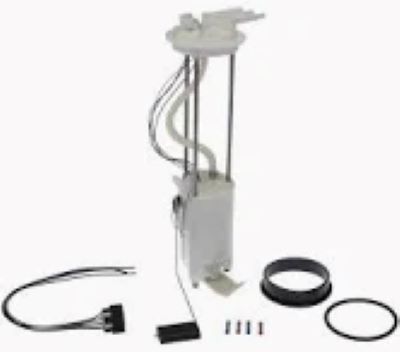How does an electric Fuel Pump differ from a mechanical Fuel Pump? Diesel engines are often equipped with a mechanical Fuel Pump, which can pump the fuel through by maximizing the action of the engine's camshaft or crankshaft. Such pumps are in older vehicles and also in carbureted engines. Mechanical Fuel Pumps typically only provide 4 to 6 psi of pressure which is good enough when accompanied by carburetors, however it's definitely not going to cut the mustard with today's modern fuel injection systems that require much more.
An electric Fuel Pump, however, is operated using electrical power and has the ability to produce significantly higher pressures—usually between 30 to 80 psi—as demanded by the fuel system specification for a given vehicle. Electric Fuel Pumps – This type of pump is typical in fuel-injected engines which are mainly used in the automotive sector today. Located inside the fuel tank, they pump at a consistent high-pressure, resulting in precise fuel delivery to the engine and better fuel efficiency.
Advantages of an Electric Fuel Pumps are that they maintain a constant pressure irrespective of the speed of the engine. Which makes them perfect for modern engines which need a 14:1 fuel/air ratio according to the latest trend of combustion. On the other hand, mechanical pumps are driven directly by engine speed–as the revs go up, so does the flow of fuel from the pump, and at low speeds this can cause problems: if fuel delivery is too slow when you drop your foot to pass that truck, performance will suffer.
More recent models of modern vehicles have made the transition from mechanical to electrical fuel pumps as part of efforts to achieve more repeatable and efficient fuel delivery. Electric Fuel Pumps: As noted in the 2019 International Energy Agency report, vehicles with fuel injection systems provide a 15% improvement in fuel efficiency over the older carbureted models; therefore, using Electric Fuel Pumps to take full advantage of such technology has been essential in maximizing performance and reducing emissions.

In terms of longevity, mechanically driven fuel pumps typically have a service life of 60,000 to 90,000 miles while electric pumps last longer on average (100,000-150,000 miles). While it is easier and cheaper to swap a mechanical pump due to its simple design, leaving the job of ensuring long life in favor of durability for electric pumps over automotive pump.
You see this play out in real life from one era to another, as with when automakers shifted from carbureted engines to fuel injection systems during the 1980s due to rising emissions regulations; a classic case study. Electric Fuel Pumps quickly became the norm as they were able to cope with the increased pressure requirements of these systems, allowing automakers to lower emissions and increase miles-per-gallon.
Together, as Henry Ford says, “If everyone is moving forward together, then success takes care of itself. From mechanical to electrical Fuel Pumps, the move is on an example of progression in the automotive world where technological advancement has enabled cars to be more efficient, robust and environmentally weighed down with than analogues before.
When restoring or servicing the car, it is important to know if your Motor uses a mechanical design fuel pump or an electric Fuel Pump in order to guarantee performance and functionality. There are many unique applications and benefits of each type based on the vehicle design and fuel delivery requirements.
